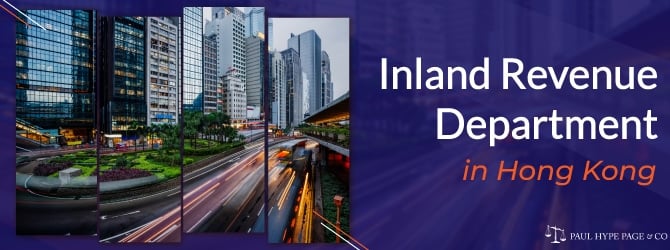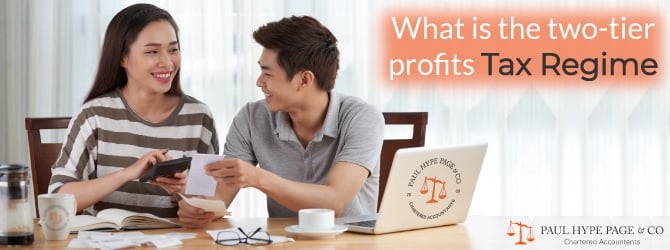The taxation system of Hong Kong is territorially based. This means that all taxes which are imposed in Hong Kong are not levied on location. This fact applies to individuals and companies alike. The Inland Revenue Department (IRD) administers Hong Kong’s tax system based on the provisions of the Inland Revenue Ordinance.
Hong Kong’s tax revenue for 2017-2018 was HK$328.6 billion, a 13.2% increase from the previous year’s collection.
All the taxation matters involving individual and corporate tax alike in Hong Kong are governed by the Inland Revenue Ordinance and its subsidiary legislation, the Inland Revenue Rules. The Stamp Duty Ordinance and Estate Duty Ordinance are also part of Hong Kong’s many tax laws. They are responsible for governing the stamp duty and estate duty respectively.
Role and Responsibilities of the Inland Revenue Department (IRD) in Hong Kong
The Tax Authorities of Hong Kong Hong Kong’s many different tax authorities work together to make the country’s tax system as effective and efficient as possible. The most important of these tax authorities is the IRD.
The primary purpose of the IRD is to maximize the amount of revenue which is collected by reducing the costs involved when collecting taxes as well as improving the efficiency of tax collection. The IRD is also tasked with improving the level of tax compliance in Hong Kong through the rigorous enforcement of tax compliance laws.
Another important duty undertaken by the IRD is that of conducting programs about the importance of being a law-abiding and tax-compliant citizen. Such programs are intended to educate the general public about these important matters. The Commissioner of Inland Revenue also performs many different duties regarding the holding of statutory appointments.
The Commissioner also oversees the collection of stamp revenue and estate duty commissions, and is also responsible for betting duty, the Inland Revenue Ordinance, and hotel and accommodation taxes including taxes involved in the business registration process.
Laws Which Are Enforced by Hong Kong’s Tax Authorities
Hong Kong’s tax authorities enforce many different tax laws. Some of the laws that are enforced by Hong Kong’s authority include those related to tax losses. Such tax losses can only be carried forward; they may not be carried backwards to previous years. There are also several other important tax laws which are enforced by Hong Kong’s tax authorities.
Transfers of shares
Sales of capital assets in Hong Kong are not subject to profits tax. Similarly, foreign sellers of shares will not have any profits tax imposed upon them. However, a transfer of stocks in Hong Kong is subject to a stamp duty rate of 0.2%. To be more specific, the vendor and purchaser both have a tax rate of 0.1% imposed on them.
Net income
According to the tax laws of Hong Kong, the net income of a company includes the following: profits which have been obtained through the conducting of business activities in Hong Kong, royalties gained from intellectual property rights, rent which has been collected through the leasing of movable properties, interest which has been derived from income, refunds from contributions such as those made to retirement scheme benefits, gains from bills of exchange, and any forms of financial assistance from external funding sources including subsidies and grants are classified as net income. All net income of a company is to be taxed by the tax authorities of Hong Kong.
Laws on Deductible Allowances
According to Hong Kong tax laws, both the depreciation of a fixed capital asset and expenses on the purchase of fixed assets are not taxable. However, tax relief is often given in the form of allowances. These allowances are available for premises and machinery within the firm which are used to generate profits.
One of the capital allowances which is involved is that of a 20% allowance on capital expenditures incurred during the construction of a particular building. Each year, an annual allowance of 4% of the initial capital expenditure incurred on the construction of an industrial or commercial building is granted. Another allowance is that of 20% of capital expenditure incurred during the renovation or refurbishment of business premises. This allowance is deductible in equal instalments over a five-year period which commences with the year in which the expenditure occurred.
Capital Allowances and Profits Taxation in Hong Kong
An initial allowance of 60% is also available for capital expenditures incurred on plant and machinery in the relevant year. An annual depreciation allowance is available for the reduction of the value of plants and machinery. The rate of depreciation can range from 10% to 30% depending on the type of plants and machinery involved.
A total of 20% of the capital expenditure incurred on environmental protection installations to a commercial or industrial building is deductible in equal installments over a five-year period which begins with the year in which the expenditure occurred. There are also special provisions which apply to plants and machinery under a sale and leaseback arrangement.
Once the specified deductions and additions have been made, the company’s taxable income will be obtained. The appropriate tax rate is applied to this income to determine the profits tax. The normal profits tax rate for corporations stands at 16.5% on assessable profits, while the tax rate for unincorporated businesses stands at 15% on assessable profits.
How Hong Kong’s Tax Authorities Punish Tax Criminals
There are penalties imposed upon those who are not compliant with Hong Kong’s tax laws. Most of these penalties come in the form of fines. Any failure to pay tax charges on or before the time specified on the tax notice is a criminal offence. If taxes are defaulted, the IRD may impose a 5% penalty, plus an additional 5% if unpaid after six months.
How Hong Kong’s Tax Authorities Attempt to Increase Levels of Tax Compliance
It is required that every person carrying out a business in Hong Kong must register under the Business Registration Ordinance and pay an annual fee and levy. This regulation imposed by Hong Kong’s tax authorities is intended to increase the amount of tax revenue collected in Hong Kong. Prospective company owners are therefore advised to first register their business before commencing business operations in Hong Kong. The annual registration and levy fee is HK$2250; however, one might opt for a three-year certification which costs HK$5,950.
Hong Kong’s tax authorities do much to keep the taxpayers of Hong Kong informed about their tax obligations. They do so by educating them on voluntary tax compliance as well as how they should implement appropriate tax strategies.
Conclusion
In summary, Hong Kong’s tax authorities diligently oversee taxation matters within the region and relevant transactions outside its borders. They enhance Hong Kong’s economy by creating tax policies that promote international trade, making it attractive for foreign traders. Hong Kong tax authorities are therefore regarded around the world as development-oriented and supportive of international trade which serves to boost the general economic status of Hong Kong.






